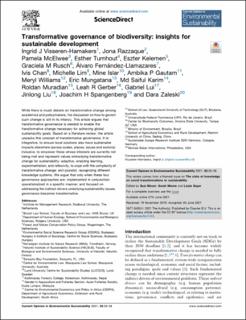| dc.contributor.author | Visseren-Hamakers, Ingrid | |
| dc.contributor.author | Razzaque, Jona | |
| dc.contributor.author | McElwee, Pamela | |
| dc.contributor.author | Turnhout, Esther | |
| dc.contributor.author | Kelemen, Eszter | |
| dc.contributor.author | Rusch, Graciela | |
| dc.contributor.author | Fernández-Llamazares, Álvaro | |
| dc.contributor.author | Chan, Ivis | |
| dc.contributor.author | Lim, Michelle | |
| dc.contributor.author | Islar, Mine | |
| dc.contributor.author | Gautam, Ambika P. | |
| dc.contributor.author | Williams, Meryl | |
| dc.contributor.author | Mungatana, Eric | |
| dc.contributor.author | Karim, Md Saiful | |
| dc.contributor.author | Muradian, Roldan | |
| dc.contributor.author | Gerber, Leah R. | |
| dc.contributor.author | Lui, Gabriel | |
| dc.contributor.author | Liu, Jinlong | |
| dc.contributor.author | Spangenberg, Joachim H. | |
| dc.contributor.author | Zaleski, Dara | |
| dc.date.accessioned | 2022-03-25T07:38:31Z | |
| dc.date.available | 2022-03-25T07:38:31Z | |
| dc.date.created | 2021-06-29T10:39:22Z | |
| dc.date.issued | 2021 | |
| dc.identifier.citation | Current Opinion in Environmental Sustainability. 2021, 53 20-28. | en_US |
| dc.identifier.issn | 1877-3435 | |
| dc.identifier.uri | https://hdl.handle.net/11250/2987514 | |
| dc.description.abstract | While there is much debate on transformative change amongacademics and policymakers, the discussion on how to governsuch change is still in its infancy. This article argues thattransformative governance is needed to enable thetransformative change necessary for achieving globalsustainability goals. Based on a literature review, the articleunpacks this concept of transformative governance. It is:integrative, to ensure local solutions also have sustainableimpacts elsewhere (across scales, places, issues and sectors);inclusive, to empower those whose interests are currently notbeing met and represent values embodying transformativechange for sustainability; adaptive, enabling learning,experimentation, and reflexivity, to cope with the complexity oftransformative change; and pluralist, recognizing differentknowledge systems. We argue that only when these fourgovernance approaches are: implemented in conjunction;operationalized in a specific manner; and focused onaddressing the indirect drivers underlying sustainability issues,governance becomes transformative. | en_US |
| dc.language.iso | eng | en_US |
| dc.rights | Navngivelse 4.0 Internasjonal | * |
| dc.rights.uri | http://creativecommons.org/licenses/by/4.0/deed.no | * |
| dc.title | Transformative governance of biodiversity: insights for sustainable development | en_US |
| dc.type | Peer reviewed | en_US |
| dc.type | Journal article | en_US |
| dc.description.version | publishedVersion | en_US |
| dc.rights.holder | © 2021 The Authors | en_US |
| dc.subject.nsi | VDP::Zoologiske og botaniske fag: 480 | en_US |
| dc.subject.nsi | VDP::Zoology and botany: 480 | en_US |
| dc.subject.nsi | VDP::Zoologiske og botaniske fag: 480 | en_US |
| dc.subject.nsi | VDP::Zoology and botany: 480 | en_US |
| dc.source.pagenumber | 20-28 | en_US |
| dc.source.volume | 53 | en_US |
| dc.source.journal | Current Opinion in Environmental Sustainability | en_US |
| dc.identifier.doi | 10.1016/j.cosust.2021.06.002 | |
| dc.identifier.cristin | 1919216 | |
| cristin.ispublished | true | |
| cristin.fulltext | original | |
| cristin.qualitycode | 1 | |

